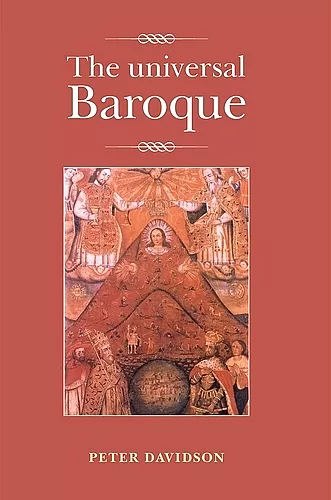The Universal Baroque
Format:Paperback
Publisher:Manchester University Press
Published:8th Jun '18
Should be back in stock very soon

‘The nation-state is the enemy of the baroque.’ This is the point of departure of this radical, even revolutionary, re-examination of the cultural history of the early-modern world. Drawing on sources in six languages, many of them hitherto unavailable to the English-speaking reader, and touching on the visual arts, architecture, music and literature, this study frees the word ‘baroque’ from being a term of periodisation into being the descriptor for a network of circulation of ideas, words, plants, arts and energies which encompassed the totality of the early-modern world.
This challenging book also forces a reconsideration of many of the prejudices of the Anglophone perception of cultural history and in doing so opens to the reader a world of wonders: the allegorical dramas of Ireland and Belgrade; the arquebusier angels of Cuzco painting; the operas and festival music of Bolivia; the vertiginous architectural fantasies of the Jacobite exiles.
''The nation-state is the enemy of the Baroque.' This is the point of departure for this radical, even revolutionary re-examination of the cultural history of the early modern world. Drawing on sources in six languages, many of them hitherto unavailable to the English-speaking reader, and touching on the visual arts, architecture, music and literature, this study frees the word 'Baroque' from being a term of periodisation into being the descriptor of ideas, words, plants, arts and energies which encompassed the totality of the early modern world.
An astonishing challenge to the custom of seeing artistic and literary achievement within the framework of national histories and individual languages. The universal Baroque ... redefines early modern culture. This is a seminal work that opens many doors for future research, and it is a delightful read.'
Nigel Smith, Professor of English, Princeton University
'Conceptually sharp, dazzling in its range, trenchant and humane, The universal Baroque prophesied many of the most important recent developments within early modern studies, and speaks just as forcibly to a new generation of scholars.'
Alison Shell, Professor of English, Renaissance Literature and Shakespeare, University College London
'Peter Davidson challenges axioms central both to post-enlightenment and postcolonial thinking ... Nationalist labels (like ‘Metaphysical’ or ‘Italianate’) so dear to critics, are rightly ridiculed, and the reader has the sense of being liberated: set free to enjoy a universal panorama of local creativity that includes flying dancers in Mexico, arquebusquier angels in the Andes and the Maria-Kannon in Japan.'
Gerard Kilroy, Professor in the Faculty of Education, Jesuit University Ignatianum, Krakow
'This is a beautifully written, provocative book that invites us to reassess our opinions – and our prejudices – about the Baroque ... The new light that his approach sheds on a complex term makes this an exciting and highly innovative book. Once I started reading it, I could not put it down.'
Susan Bassnett, Professor of Comparative Literature, University of Warwick
'Peter Davidson offers a profoundly original idea of the baroque, not as a stylistic marker, but as a mode of communication, circulation, and interaction over a long period and throughout the world – 'an international system of communication in all the arts'. The readings and analyses are beautifully articulated, and a great deal of unfamiliar material is integrated into the argument. This book is exciting, essential, a revelation.'
Stephen Orgel, J. E. Reynolds Professor in the Humanities, Stanford University
'A masterful, far-reaching reinterpretation of our understanding of the cultural history of the early modern period, Peter Davidson’s remarkable book is a triumph.'
Anne Dillon, Lucy Cavendish College, Cambridge
'The book is a marvelous way in to seeing how our understanding of the very term 'baroque' - or 'mannerism' as it was swiftly renamed by those in charge of policiing cultural activity - has been influenced, tainted, even, by a highly successful Protestant project. Not that that is its point at all, those 'allegiances of religious confession or nationality which have come to seem, since the nineteenth century unavoidable descriptors of all cultural endeavour'. No. The book is far more sophisticated and nuanced and creative than that and presents for us a liberating kind of sensibility that allows for all kinds of artwrok fashioned in all kinds of ways, in forms and effects that are breathtaking in their understanding of plasticity and invention.'Kirsty Gunn, P. N. Review
ISBN: 9781526126931
Dimensions: 234mm x 156mm x 12mm
Weight: 327g
208 pages